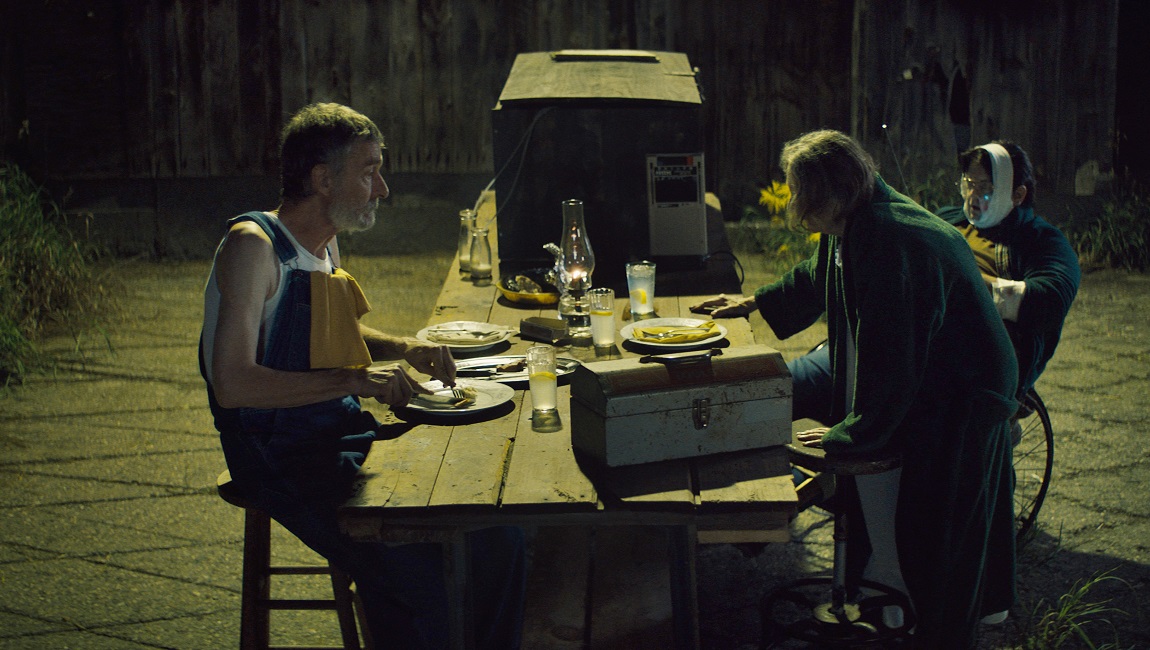Honeydew is the latest effort to angle toward the elevated horror label without providing much substance to this framework.
Premiering at the Nightstream Film Festival last year (its planned run in Tribeca’s slate nixed as a result of pandemic restrictions) to muted, though mostly positive, reception, Devereux Milburn’s debut announces its presence through a self-conscious thicket of abstraction. The prologue, featuring shots of farmland intercut with tightly-framed scenes of food preparation and consumption, all set to mumbly recitations of scripture from 2 Timothy 3 loaded with eschatological import, already looks to whet the appetites of many a high-genre fan. And to further reinforce the idea that Honeydew departs significantly from the callow, mindless crowd-pleasers that populate midnight-movie slates across the festival circuit, we’re treated to another introductory fragment, this time more dissociative and bizarrely edited, before finally arriving at the main attraction.
Rylie, a botany student conducting research on the sordico fungus — a fictional stand-in for ergot that’s explained to us in the YouTube primer she watches, for the purpose of augury more than her own academic edification — has enlisted her boyfriend Sam’s help for the weekend. Their relationship is on the rocks, a fact not readily disclosed in this opening stretch, but hinted at incrementally through stylistic ruptures as Milburn rummages around a grab-bag of retro curlicues: ’70s-era exploitation title cards, split screens, canted angles, slow rack focus. His familiarity with the signature expressions of influential antecedents is well-displayed, but he demonstrates little knowledge of how to marshal them toward productive ends. The result, then, is an innocuous slice of backwoods horror that summons up expected beats, all the while dogged by a clumsy pro-forma sensibility. The couple proceeds to their chosen campground for the night, only to be accosted, after a hilariously dispassionate round of shagging, by the landowner. Unfortunately, their car battery’s eaten one, there’s no cell service in these forsworn parts, and they’re forced to trek through the woods searching for help. The kindness of strangers prevails, as such things go, and they wind up in the stewardship of aging Karen and her disabled son, Gunni. What follows is a glacial uncovering of off-kilter detail, tidings ignored or outright missed, and the queasy omnipresence of things going bump in the night, as Karen’s promises of relief remain ever-deferred amid suggestions that Gunni’s paralysis might have been deliberately induced.
Secondary to these unholy circumstances are the equally suffocating conditions of Rylie and Sam’s love, soured by time and declining in passion, and the latter’s no cholesterol, no high-fructose corn syrup, no refined vegetable oil diet. Sam remains ornery and closed-off for the most part, mired in the taciturn brooding of a damned individual, with a clandestine meal of steak late in the film producing in him an orgiastic reverie that conjures his sole moment of emotional inflection. It’s not altogether a good sign when a character’s dietary preferences are made more memorable than any deeper traits, but such is the apathetic mode Honeydew contents itself with steering in for its entire (and painfully protracted) middle stretch. Its two leads’ behavioral vagaries and psychological complexities are shaded with the barest foundational insinuations, pitted against each other in a state of silent antagonism unmoored from any specific precarity that might lend consequence to it. Coupled with the film’s unwillingness to develop its folkloric set-up further or extend the tired dichotomy of city dwellers and barbaric yokels into any interesting or provocative ground, and it’s clear that Milburn sees himself firmly situated within a rising trend of anti-genre works aspiring to the label of “elevated horror” (as dubbed by John Krasinski). Taken in whole, these films strive to rework an adolescent immaturity associated with horror into deep, intellectually-stimulating inquiries into the nature of the soul or trauma or abuse (or any other such metaphorical fodder), trading in the most sterile forms of iconographic fancy, softballed transgression, and textual metonymy. Honeydew delivers on those three tenets with gusto, edging at some confused, if possibly unintentional, linkage between religious fanaticism, with its demands of cosmetic purity and upkeep, and body negativity. Refusing the strictures of journeyman filmmaking and setting out with a missive of defiance, it’s hard to tell where Milburn can (or will) go from here — one hopes, at least, for something more willing to take seriously the building blocks assigned by its chosen framework.







